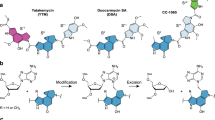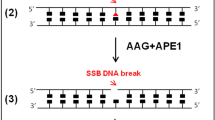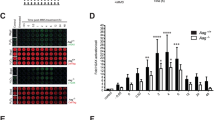Abstract
Cells exposed to low doses of N-methyl-N′-nitro-N-nitroso-guanidine (MNNG) or methyl methanesulphonate (MMS) acquire resistance to both the mutagenic and lethal effects of a challenging dose of the same agents (ref. 1, and ref. 2 for a review). This response, termed adaptation, has been ascribed to the induced synthesis and accumulation of O-6-methyl-guanine (m6G) DNA methyltransferase3,4 which rapidly demethylates the m6G residues induced by the challenging dose3–5. Mutant studies, however, indicate that mutagenic adaptation and killing adaptation are at least partly under different genetic control and may therefore involve the induction of different repair enzymes6,7. Whereas mutagenic adaptation correlates with the induction of the transferase, the data presented here show that killing adaptation can be ascribed to the induction of a DNA glycosylase. This inducible glycosylase releases the alkylation product 3-methyladenine (m3A) from DNA in vitro as does the constitutive m3A DNA glycosylase previously characterized by Riazuddin and Lindahl8. However, the enzymes are encoded by different genes and appear to have different roles in DNA repair in vivo.
This is a preview of subscription content, access via your institution
Access options
Subscribe to this journal
Receive 51 print issues and online access
$199.00 per year
only $3.90 per issue
Buy this article
- Purchase on Springer Link
- Instant access to full article PDF
Prices may be subject to local taxes which are calculated during checkout
Similar content being viewed by others
References
Samson, L. & Cairns, J. Nature 267, 281–283 (1977).
Cairns, J., Robins, P., Sedgwick, B. & Talmud, P. Prog. Nucleic Acid Res. molec. Biol. 26, 237–244 (1981).
Karran, P., Lindahl, T. & Griffin, B. Nature 280, 76–77 (1979).
Olsson, M. & Lindahl, T. J. biol. Chem. 255, 10569–10571 (1980).
Schendel, P. & Robbins, P. Proc. natn. Acad. Sci. U.S.A. 75, 6017–6020 (1978).
Jeggo, P., Defais, M., Samson, L. & Schendel, P. Molec. gen. Genet. 162, 299–305 (1978).
Jeggo, P. J. Bact. 139, 783–791 (1979).
Riazuddin, S. & Lindahl, T. Biochemistry 17, 2110–2113 (1978).
Karran, P., Lindahl, T., Øfsteng, I., Evensen, G. & Seeberg, E. J. molec. Biol. 140, 101–127 (1980).
Karran, P., Hjelmgren, T. & Lindahl, T. Nature 296, 770–773 (1982).
Yamamoto, Y., Katsuki, M., Sekiguchi, M. & Otsuji, N. J. Bact. 135, 144–152 (1978).
Yamamoto, Y. & Sekiguchi, M. Molec. gen. Genet. 171, 251–256 (1979).
Sedgwick, B. J. Bact. (in the press)
Seeberg, E., Nissen-Meyer, J. & Strike, P. Nature 263, 524–526 (1976).
Author information
Authors and Affiliations
Rights and permissions
About this article
Cite this article
Evensen, G., Seeberg, E. Adaptation to alkylation resistance involves the induction of a DNA glycosylase. Nature 296, 773–775 (1982). https://doi.org/10.1038/296773a0
Received:
Accepted:
Issue Date:
DOI: https://doi.org/10.1038/296773a0
This article is cited by
-
Archaeal DNA alkylation repair conducted by DNA glycosylase and methyltransferase
Applied Microbiology and Biotechnology (2023)
-
Tiling array study of MNNG treated Escherichia coli reveals a widespread transcriptional response
Scientific Reports (2013)
-
Repair deficient mice reveal mABH2 as the primary oxidative demethylase for repairing 1meA and 3meC lesions in DNA
The EMBO Journal (2006)
-
AlkB-mediated oxidative demethylation reverses DNA damage in Escherichia coli
Nature (2002)
-
Induction of gene conversion in yeast cells continuously cultured at high radiation background
Radiation and Environmental Biophysics (1995)
Comments
By submitting a comment you agree to abide by our Terms and Community Guidelines. If you find something abusive or that does not comply with our terms or guidelines please flag it as inappropriate.



